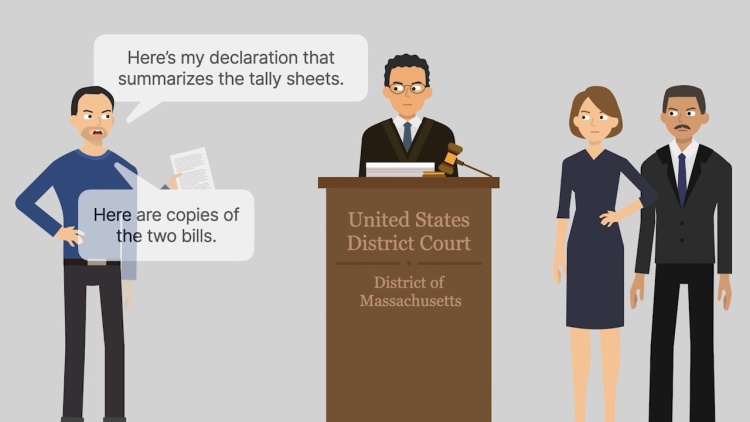Sylvania Electric Products v. Flanagan
United States Court of Appeals for the First Circuit
352 F.2d 1005 (1965)

- Written by Christine Raino, JD
Facts
On May 27, 1963, pursuant to an alleged oral agreement with Sylvania Electric Products, Inc. (Sylvania) (defendant), Paul L. Flanagan (plaintiff) commenced hauling material from Sylvania’s work site. Pursuant to the alleged agreement, Flanagan was to receive compensation at the rate of $13 per truck per hour for hauling ledge material using his own trucks and other trucks he rented for the job. The entire hauling operation took one thousand nine hundred thirty-two and a half hours, resulting in a final bill of $25,267.50, which Sylvania refused to pay. Flanagan commenced a breach of contract action that was removed to federal court on diversity grounds. At trial, Flanagan presented in support of his claims invoices and a summary based on data taken from tally sheets that had been prepared on site from the daily truck hour slips. While Flanagan testified that the summary and invoices were based on information from the tally sheets, he did not produce the tally sheets. Sylvania objected to introduction of the summary and invoices in lieu of the tally sheets, and the court suggested that Flanagan produce any tally sheets in his possession, but he did not do so. Flanagan testified that it was not his practice to keep the tally sheets after checking them against the invoices, but evidence indicated that he had some of the tally sheets in his possession at a time when he knew Sylvania was disputing payment for the hauling services. Flanagan also admitted to the court that he might have had some of the tally sheets at home. The jury returned a verdict for Flanagan and Sylvania appealed, asserting that the district court’s admission of the invoices and summary without producing the tally sheets violated the best evidence rule.
Rule of Law
Issue
Holding and Reasoning (McEntee, J.)
What to do next…
Here's why 907,000 law students have relied on our case briefs:
- Written by law professors and practitioners, not other law students. 47,100 briefs, keyed to 996 casebooks. Top-notch customer support.
- The right amount of information, includes the facts, issues, rule of law, holding and reasoning, and any concurrences and dissents.
- Access in your classes, works on your mobile and tablet. Massive library of related video lessons and high quality multiple-choice questions.
- Easy to use, uniform format for every case brief. Written in plain English, not in legalese. Our briefs summarize and simplify; they don’t just repeat the court’s language.





